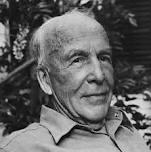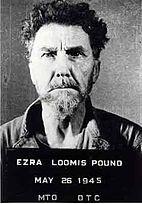Angus had been invited to attend the rehearsal of a play starring his old friend, Mr. Zuss. He arrived a few minutes after the appointed time and found the actors already on the stage. He took a seat in the middle of the mostly empty theater; as best as he could tell, only two other men were in the auditorium.
One of them sat in the row directly in front of him, a little to his right. He had tufts of scruffy white hair, a Van Dyke beard, and although his eyes were lively he had a haunted look about him. When Angus sat down he turned and nodded at him and Angus smiled and nodded back. They watched the play for thirty minutes or so until the the third man, who was sitting a few rows away from the stage and was holding what looked like a copy of the script, called for a break. The actors headed off for coffee or to look over their lines for the next scene. The man with the script – Angus assumed he was the director – sat hunched over his papers making notes.
Mr. Zuss appeared at Angus’ arm then, holding two cups of coffee. He offered one to Angus.
“Thank you,” Angus said. “I didn’t know if you’d be able to see me out here or not, under the lights.”
“I couldn’t, from the stage,” said Mr. Zuss. “But I knew you’d be here.”
“Is that the director?” asked Angus, inclining his head forward toward the man with the script.
“The writer. Mr. Archibald MacLeish,” replied Mr. Zuss.
“I am enjoying it. It’s awfully sad, though.”
“Mr. MacLeish saw two world wars,” said Mr. Zuss. “Most of us will never see a city destroyed under bombing. Most of us – thank God – will never see something like Hiroshima. But all of us will know loss in some fashion. That’s what the play is about, the question of suffering. And ultimately the promise of hope.”
As they spoke the man in the next row turned to look at them. He seemed to be listening to their conversation but did not join it. Angus smiled at him again, trying to be cordial, but the man abruptly stood up and walked down to where Archibald MacLeish was sitting. He sat beside the writer, who reached out and rested his hand on the other man’s shoulder for just a moment before he returned to his script.
“Is he one of the actors as well?” asked Angus about the man with the white hair.
“You mean that fellow, the one who was just sitting here? Oh, no, he’s not one of the actors. But he’s one of Mr. MacLeish’s projects, I guess you could say.”
Someone yelled from the stage, “Places!” Mr. Zuss stood and walked down, pausing for a moment to say hello to the two men now sitting together several rows down. The rehearsal continued. Angus particularly liked the close of the play, when Sarah, J.B.’s wife, turned to him and said:
Blow on the coal of the heart.
The candles in churches are out.
The lights have gone out in the sky.
Blow on the coal of the heart
And we’ll see by and by.
He waited for his friend as the actors and stage hands began packing up. Finally he spotted Mr. Zuss, who was now wearing a long scarf wound around his neck several times, and a wooly looking fedora.
“You look like an actor now,” said Angus when he caught up with him.
“Oh, this?” said Mr. Zuss, pointing to the scarf. “It comes with the SAG card.” He smiled. “Shall we have some dinner?”
They left the theater and walked together down the crowded sidewalk. “I know a good place. It’s just a few blocks away.”
The air was turning a little chilly and the street lights lit up as they made their way.
“You never told me who the other man was, back there,” said Angus, who had his hands shoved into the pockets of his jacket. He thought he could smell wood smoke in the air.
“I’m surprised you didn’t recognize him. He was very famous once. Well, still is, I guess, though for the wrong reasons. That was Ezra Pound.”
“The poet?” Angus pulled up short.
“Oh, yes. The poet. And the former resident of St. Elizabeth’s Psychiatric Hospital, and the former disseminator of fascist propaganda during the Second World War. You’ve heard of him then?”
“Of course. He said some unforgivable things. Not only about his country, but about innocent people. Hateful things.”
“He did. No one knew what to do with him after the war. And he’d gone pretty batty, you understand. When he was captured in Italy by American forces he was kept in a tiny cell for days. I’m not defending what he said, of course. But he was a troubled man. And when he was found unfit to stand trial he was committed to St. Elizabeth’s for twelve years.”
“You said that he was one of Mr. MacLeish’s projects.”
“He was. Ernest Hemingway got the ball rolling, but he was, after all, only a writer. MacLeish was a statesman. He had the necessary clout. Once he started pulling strings, it was a only matter of time before Pound was released.”
“Should he have been? After the things he was advocating for, during the war? After the things he said?”
“Pound’s doctors believed him to be insane but not violent. Keeping him confined was a punishment with no therapeutic purpose. Releasing him was probably a step towards healing after the war. Eventually, Pound repudiated the things he’d said. And the man wrote The Cantos. Everyone has some value, in my opinion.”
“It’s like what Sarah said to J.B.,” said Angus.
You wanted justice, didn’t you?
There isn’t any. There is only love.
“Here we are!” said Mr. Zuss as he opened the door of a canopied building. Angus ducked inside, grateful for the warmth and chattering noise within.
… to be continued ….
Of course, I’ve taken some liberties here. When Pound was released from St. Elizabeth’s in 1958, the same year that MacLeish’s play J.B. was awarded the Pulitzer, he traveled immediately to Italy and remained there for years. Pound continued to espouse his anti-Semitic and Fascist views at least privately for some time before he finally rejected them, calling himself a “moron” who “knew nothing.” Shortly before his eighty-seventh birthday, he composed a poem in which he rejected the sentiments he had expressed, somewhat horrifyingly, in a poem called “Usury.” Pound remains an extraordinarily divisive and controversial figure in literature. Not everyone is convinced that he truly reformed. But his poems, especially “In a Station of the Metro,” appear regularly in anthologies and are taught in most American literature classes.
MacLeish, on the other hand, is my personal hero. I like to think that given the opportunity to sit beside a newly released Pound at a rehearsal of J.B., he would have placed his hand reassuringly on the broken man’s shoulders, as I have often seen criminal defense lawyers do for their clients at sentencing or before the reading of the verdict. I do think MacLeish would have done that. With the possible exception of “Ars Poetica,” which contains the famous exhortation that “[a] poem should not mean/But be”, MacLeish’s popularity has waned since he won three Pulitzer Prizes, a Tony Award, an Academy Award, a Bollingen Prize, and the Presidential Medal of Freedom.


